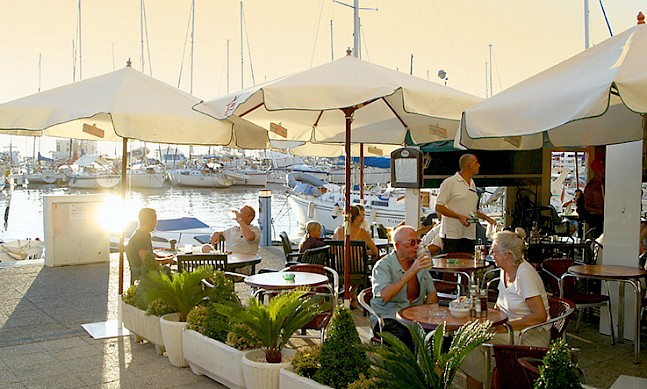Having been appointed minister for tourism in 2011, Neil Costa moved over to the role of minister for business and employment in the ministerial reshuffle in December 2014. He spoke to The Report Company about what makes Gibraltar – with its enviable unemployment figures and strong business community – so successful.
The Report Company: What are the biggest differences between this post and your previous post and what have been the greatest challenges you have faced so far?
Neil Costa: The port and tourism portfolios both required a commercial steer and a staple diet of meetings with industry players. My employment portfolio means that I continue to meet with industry players and employers; I also meet, however, with members of the general public who may be seeking employment. This direct interaction with members of the community at a personal level is very rewarding, especially when my officers and I are able to guide and assist these individuals into gainful employment.
In terms of the greatest challenges I have faced, I am accused of eternal optimism and it is true that I rarely see problems but rather opportunities. My biggest opportunities, therefore, will be to keep the levels of unemployment to record-busting lows. In this respect, the number of Gibraltarians registered as unemployed at the end of May has fallen to 190, which is the lowest number ever and the very first time that the number of unemployed has fallen under the 200 mark. Only recently I was told that this constitutes virtually full employment, to which I replied that my limited understanding of mathematics meant that I still had quite a long way to go.
TRC: Where do you see scope for reform to ensure the Gibraltarian workforce is able to meet the demands of the ever-more innovative industries taking up residence in the territory?
NC: The focus of HM Government of Gibraltar is centred on ensuring the right economic, legislative and regulatory conditions for our economy to flourish. This also includes ensuring that we have a pool of skilled labour to fill in the gaps the market needs. In our endeavours to cut red tape for new businesses, facilitate existing businesses and incentivise their expansion, parliament voted to enact the fair trading act. I am very proud to have led the team that has seen this legislative project come to fruition, which underwent an unprecedented level of consultation with the business community to ensure that the act is a force for entrepreneurship and competition and not another bureaucratic burden.
Although the ambit of the act is wide, it will streamline business procedures and, critically, establishes a single point of contact that allows an entrepreneur in person to establish a business by attendance at a single government office or online through the web portal. I cannot underestimate the beneficial impact of the fair trading act on qualitatively easing a business’s administrative burden. I am also gratified to personally oversee the opening of the Office of Fair Trading, which will play a crucial role in ensuring a level playing field for businesses, in maintaining good business practices and in upholding consumers’ rights.
If you consider the wide-ranging business-friendly incentives the government has introduced over the last 3 years, the enactment of the fair trading act and our policies on education, with the establishment of the University of Gibraltar that will prominently feature professional development courses, you quickly come to realise that policy by policy, we are constructing the optimum foundations on which to sustain a resilient and modern employment model. We also have a close ear to the ground to identify skill gaps and move quickly in providing the right training.
I meet regularly with the human resources forum that is comprised by HR managers from different local businesses, some of which are multinational listed companies headquartered in Gibraltar. We listen to what they need and once we identify the skills gap, we work in tandem with the director of education to find the quickest and best way to plug that lacuna. Our business environment also nurtures itself and our thriving gaming industry is the perfect example. Gibraltar has long had a policy of only accepting the most reputable gaming companies. Over time, these companies have attracted the most talented people in the gaming industry. This, in itself, encourages other gaming companies to set up here, fuelling our economy in many ways, not least, by the establishment of businesses that provide services to the gaming companies, increasing employment opportunities and the payment of taxes and social insurance to the public purse – what economists call a virtuous cycle.
TRC: One of your first actions upon taking up this role was to set up a Small Business Board and put in the Gibraltar Business Nurturing Scheme (GBNS). What does this mean for entrepreneurs in Gibraltar?
NC: The Small Business Board (SBB) allows the government to maintain a close working relationship with individual businesses and Gibraltar’s two principal business umbrella organisations: the Gibraltar Federation of Small Businesses and the Chamber of Commerce. The SBB, therefore, represents the vast majority of local businesses. Small businesses are the largest employer in Gibraltar and so are the lifeblood of our economy. It is in our interests that we know what most concerns businesses and act decisively where we have the power to do so.
The GBNS came about as a result of the discussions at the SBB in respect of the chronic lack of credit for start-up businesses. This scheme is now up and running, having received numerous applications for these low-interest loans. Applications for this scheme are scored by a committee comprised by a chamber representative, a GFSB representative and a government official. The scores take into consideration the purpose of the loan and score them against set criteria. Applications are filtered and given a preliminary score. Applicants who obtain a satisfactory score meet with the committee. The meeting allows the applicant to meet with individuals operating in the business field and avail themselves of a steer prior to launching or expanding their business. After the meetings, the scores are finalised and a majority recommendation is made for my final approval. We hope that the success of this fund will demand that it be extended into the next financial year to assist an even greater number of start-up businesses.
My view is that the easier it is to do business in Gibraltar, in terms of the availability of credit but also due to the beneficial regulatory climate, the more entrepreneurs that will launch their business from here. It is not insignificant to note that HM Government of Gibraltar has not stood still in addressing the question of credit and the chief minister recently announced the opening of the Gibraltar International Bank. Further, from my discussions with top managers from abroad in different industries, it is not only the Mediterranean lifestyle that entices them to set up shop here. Gibraltar also boasts a multi-talented pool of potential employees and a superb offering of professional service providers.
“Policy by policy, we are constructing the optimum foundations on which to sustain a resilient and modern employment model”Tweet This
TRC: What impact will your planned reforms of the tribunal process in Gibraltar have on investors and businesses, and what do you aim to achieve by reforming the system?
NC: Her Majesty’s Government of Gibraltar is undertaking a wholesale review and substantive reform of the existing industrial tribunal dispute resolution and adjudication process. Soon after the re-allocation of ministerial responsibilities in December of last year, the review of the current employment tribunal system was progressed by launching a wide-ranging consultation with various representative groups and individuals. The bodies that have submitted written proposals to the ministry include Unite the Union, the Gibraltar General and Clerical Association, the Bar Council and the Chamber of Commerce. Whilst in the United Kingdom, my legal counsel and I held meetings with the Hon Mr Justice Langstaff, president of the employment appeal tribunal and Judge Elizabeth Potter, the London regional employment judge from HM Courts & Tribunal Service. The respective tribunal processes in the UK were discussed and the meetings allowed us to raise legal and administrative issues in the context of the pending domestic reforms.
We had the privilege to learn first-hand about the main judicial and administrative processes from senior judges involved in the day-to-day management of employment tribunals and appeal tribunals in the UK. We also had the opportunity to be shown the physical layout of the courtrooms and to learn of some of the duties carried out by the administrative support officers.
Our reforms will introduce mandatory mediation prior to a case being heard before a tribunal. This should reduce the number of cases going before a tribunal and encourage reinstatement or even a simple apology, preserving the employment relationship over a monetary settlement.
TRC: One benefit of Gibraltar’s size is the accessibility of government, and the ease with which the private and public sector can communicate. What more could be done to ensure the interests of the business are taken fully into account?
NC: Interestingly, some commentators observe that a small nation suffers from an inherent disadvantage. I could not disagree more. In fact, small is not just beautiful, but it is our greatest strength. Nowhere else in the world, and certainly not in a place that enjoys such a sophisticated political structure and prosperity as Gibraltar, would anyone expect to be given a meeting within days of requesting it and certainly not with a high level official or government minister, nor would a person ordinarily expect a reply to their email on the same day.
We have a number of direct communication forums such as the small businesses board and the human resources forum. As a result of these structured communications, we continually make significant strides in ensuring that their concerns are addressed and interests are accommodated. One prime example is the introduction of the fair trading bill, which establishes an office of fair trading, ensuring a level-playing field for all businesses. Moreover, I regularly meet with individual business owners and managers, which ensures not only a good working relationship, but also allows us to keep an ear to the ground when planning ahead. There is no one better placed than businesses themselves to advise the government.
TRC: According to a recent data produced by Eurostat, one of the EU’s worst unemployment black spots is Andalucia, just over the border. What knock-on effect does this have on Gibraltar, and how feasible is it that Gibraltar could act as an economic motor for the greater area?
NC: Gibraltar has such a high demand for employment that it would be impossible for this demand to be satisfied locally. This was proven when the frontier last closed back in 1969; Gibraltarians had to take on multiple jobs and, thankfully, Moroccan nationals immigrated here to keep our economy alive. To this day we are extremely grateful to them and many have made Gibraltar their home. Nowadays, we have cross-frontier workers that travel into Gibraltar daily to earn their living. The knock-on effect is a symbiotic relationship: we need the human resources and nearby Spain is unfortunately suffering from one of the highest unemployment levels in the whole of Europe. The latest study of the Gibraltar Chamber of Commerce shows that Gibraltar’s GDP accounted for just over one-eighth of the entire Campo economy in 2007 and that Gibraltar accounted for one out of every six jobs in the region of the Campo de Gibraltar. Further, however, our workforce is not solely comprised of Gibraltarians and Spanish nationals; we have an assorted workforce which includes expats from the UK and other workers from the EU and further afield.
TRC: What would you like most to achieve during your time in this role, and how optimistic are you about Gibraltar’s future in the areas of business and employment?
NC: I would like to continue to push down our unemployment to new record lows, facilitate the excellent work of the private sector so that they may create even more employment opportunities, achieve everything in our power to assist businesses provide better jobs and train talented candidates to fill them, increase the number of new businesses setting up in Gibraltar and see more existing businesses expand both locally and internationally. All of this takes hard work and perseverance, which the government will continue to discharge.
“My view is that the easier it is to do business in Gibraltar, in terms of the availability of credit but also due to the beneficial regulatory climate, the more entrepreneurs that will launch their business from here”Tweet This










